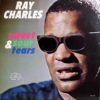“Cry Me A River”
Song by Ray Charles
“Cry Me A River” fits the bill of Ray Charles’ January 1964 LP Sweet And Sour Tears, on which every song mentioned tears or crying in the title. Ray’s version of this Julie London hit is a rather noisy, swinging affair, with an air of uncomfortable claustrophobia about it.
Arthur Hamilton wrote “Cry Me A River” and it became a huge hit for London in 1955. Her version was famous for its sparse arrangement and for the husky, clenched-teeth bitterness in London’s wounded singing.
The song is a mixture of vitriol and heartache, the bluster of the former an attempt to balance the bitterly-revealed latter.
You say you are lonely
You cry the whole night through
Well you can cry me a river
Cry me a river
(I cried a river over you)
Ray Charles’ “Cry Me A River” is dominated by Sid Feller’s strident brass section which extends itself forcefully between almost every line that Ray sings. The arrangement never seems to be able to settle on any one mode: as soon as a loud, high melody jolts the listener it dies away and a smooth, lower sounds drifts in. It’s exhausting to hear.
But Ray’s singing is certainly the element that gives this “Cry Me A River” its irksome feeling of unrest. He somehow manages to sound both aggrieved and distracted – confrontational and distant. The vocal approach made possible by the fact that his heroin addiction had reached something of a zenith at this point; Ray was, in a way, both in control and out of control at this stage of his career and the dichotomy is audible on performances like “Cry Me A River”.
His commitment to the song is undeniable but the cruel violence of the brass arrangement seems to hammer him down, its unpredictable changes acting like a talented and quick-witted pugilist dancing around the ring and flummoxing its opponent. Ray, punch-drunk and irritable, holds his own but only adds to the unsettling atmosphere of the performance.
Things calm down somewhat during Ray’s aggressive piano solo; he is interrupted once by some boisterous brass but basically gets to express himself musically with his flying fingers, which eventually settle on a compelling, circular pattern before he lets his voice loose again.
On “Cry Me A River” Ray Charles proves that the angry, dismissive, and emotionally complex moods of someone like Bob Dylan could be just as richly expressed in “conventional” musical terms as in rock and roll. It’s quite a trip; Julie London must have been rather shocked.
